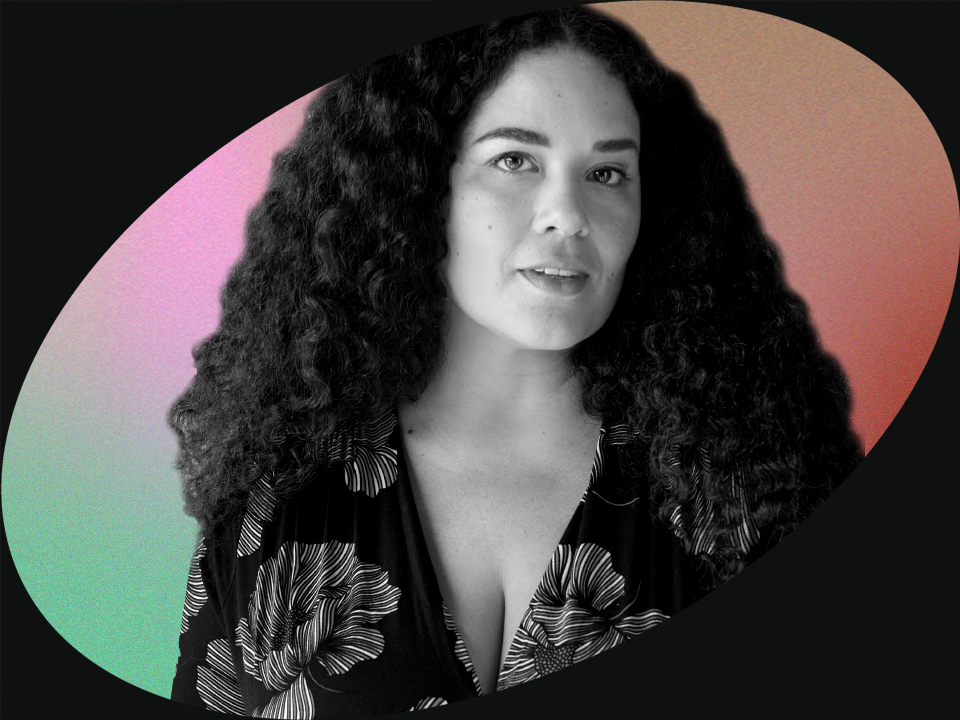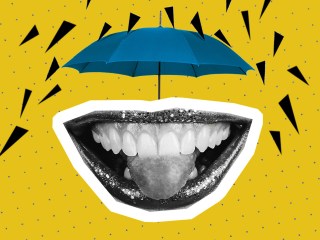Jungalow Founder Justina Blakeney Isn’t Getting Caught up in the B.S.
“I feel euphoric when I discover something new about myself that I've either been ignoring or haven't been paying attention to for the last 40, 43 years.”
On an R&R spa break, Jungalow Founder and Creative Director Justina Blakeney checked in to spread the word on the healing power of plants and how home design can shift your outlook. “Your home can support your growth, and I think it's really a magical way to work with your mental health,” says the colorful entrepreneur. Here, Blakeney shared the mental fitness exercise that’s keeping her grounded, how to cultivate a space that matches your mental well-being needs, and the importance of positive self-talk.
[Sign up here to never miss these candid conversations delivered straight to your inbox.]
WM: How are you feeling lately?
Justina Blakeney: I've been really feeling the ebbs and flows of life strongly. So some days I feel damn near euphoric, and some days I'm like, Whoa, this is really rough. So I think [I feel] high highs and low lows right now. I think a lot of it just has to do with sort of the macro sociopolitical climate that we're in right now, but shit feels a little bit hectic.
WM: When the news cycle is relentless, what helps you take a step back and recenter your mental health?
JB: Honestly, I tune out. I stopped listening to the news. I stopped talking about it. I think there were weeks, months, and years where I was super plugged in. I think once the pandemic hit and the heaviness felt so omnipresent in my life, I really had to start making conscious decisions about when to allow myself to be present to the outside world and when to allow myself to be present to my inner world and be really decisive and intentional around that.
In my work, I spend a lot of time on Instagram and spend a lot of time on all these social platforms, and it takes a toll. I also think there's no reason for me to be that plugged in. It's not helping the world, it's not helping me. So when I find that it's starting to take a toll on me, the first thing I do is just [think], OK, I need to unplug and do something creative. Generally speaking, that's sort of my outlet. So I'm not just consuming, but I'm expelling [laughs] in a way that, for me, feels cathartic.
WM: You said you're also feeling a bit euphoric, so what's invigorating you?
JB: I'm being invigorated by communing with nature in ways I haven't before. I also have been doing a lot of personal work getting to know my body better. I've been working with a therapist who specializes in being able to feel your body more and listen to yourself and your body more. As I've been on that journey now for a little over a year, I feel euphoric when I discover something new about myself that I've either been ignoring or haven't been paying attention to for the last 40, 43 years [laughs].
WM: What's one of those things you've learned about yourself?
JB: Some of these things can sound kind of subtle, but one of the exercises that I've been doing in therapy is get grounded before or when I am starting to feel a little out of control or out of sorts or not grounded. The way that I do that is I actually tune into what's happening with my feet. I feel the blood in my feet and any tingling sensations or the way the wind might feel on my feet and the way my feet feel in connection to the earth, and I feel the earth supporting me.
It's so random, but I'm getting to know how my feet feel. I can kind of extrapolate that to all these different areas of my body that I think, for so many years, I just haven't ever paid attention to how my feet feel or how my jaw feels or how my hands feel.
Giving myself even one minute to tune into that, it gives me messages about what I'm feeling and then how I can act in response to those feelings. It's a little esoteric, but it's been a really helpful practice. Something that might make it make more sense is when you are doing meditation and those kind of exercises, you're focused on your breath, right? And you kind of feel the breath, the air entering into your body, and in and out, and that creates a connection with the world. Touching the earth and [having] all these touchpoints with mother nature and [feeling] that connection, it makes me feel like I'm part of something bigger. That connection is really important in my life, in my work, in my family, and it's really important for my mental health.
WM: As a designer, what helps you cultivate a home environment you feel good in?
JB: That’s my specialty. That's my pop-off. I truly believe that your home can support your dreams. Your home can support your growth, and I think it's really a magical way to work with your mental health. For me, that really means designing spaces and creating space for how I want to be in the world. For me, that means bringing in lots of color; color is something that I find invigorating and soothing and relaxing and makes me happy. Tuning into those colors that give me those kinds of emotions and then splattering those colors throughout my home is something that brings me a lot of joy.
Something that makes me feel connected is old things, things with soul, things that came from people that I love, things that were made by people that I love, or people that I maybe don't love but just admire their sensibility or their connection.
[It’s] really important to surround myself with those emotional objects, emotional art, and plants are such a huge part of what I think one can do [to make their space their own]. It's such a low-lift thing to create more health and well-being at home. Caring for plants is a very meditative exercise. It also gets us as humans more comfortable with life cycles and ideas of birth and death. As you watch the plants go through their natural cycles, there is something about that that really speaks to my soul and makes me sort of understand that death doesn't have to be scary, and it doesn't have to be sad. The plant dies and you put it in the compost and you make new soil for your young plants. There's something really beautiful about that. Caring for plants at home has given me this connection to what's bigger than myself in what can really be synthesized into something so tiny. So a tiny bud or a tiny leaf starting to sprout might feel mundane, but there is something so special and so magical about watching that process happen and being a part of that process by caring for the plants. Plants are magic.
WM: You have a young daughter. Is there anything being a mother has taught you about mental health?
JB: They're always watching us. For me, that means checking myself if I ever am acting self-conscious or putting myself down or any of that kind of energy, because I don't want her to soak that up from me. I think there's a real intentionality for me behind making sure that when I'm looking in the mirror and I'm like, OK, I like you today. And not even just about looks, but just about the way I carry myself, my confidence. She needs to see that, and then she soaks that up. I got that from my mother. My mom and I have very similar body types and stuff, and I just never heard her kind of talking shit about herself in front of me. [After I] became a grown up, I hear so [many] women doing that constantly. It's just like, who are you helping doing that? [It’s] sad. It's helped me be aware of the messaging that I'm putting out for myself and for her.
WM: If you were to talk to yourself like you were talking to a friend or your daughter, what advice would you give yourself right now?
JB: Slow down. … The last couple of weeks, I've been seeing a lot of messages around telling me to slow down. I think because I'm very ambitious and I love my work and I have all these dreams and goals and things I wanna do and places I wanna go and people I wanna meet, I tend to rush through things, and I tend to wanna get places fast. It's like, what am I rushing toward? Like, I need to slow down… and so [go to] the spa [laughs] and notice the sprouts and call a friend. You know what I'm saying? It's so easy to get caught up in all the bullshit. In this moment, the taking it slow and enjoying and savoring is what I want to say to myself and to my friends and to my daughter.
This interview has been edited and condensed for length and clarity.
Wondermind does not provide medical advice, diagnosis, or treatment. Any information published on this website or by this brand is not intended as a replacement for medical advice. Always consult a qualified health or mental health professional with any questions or concerns about your mental health.




